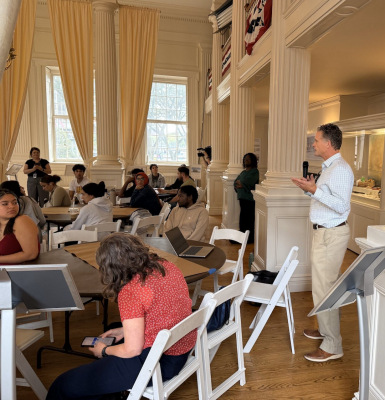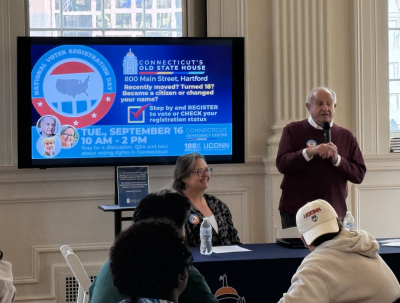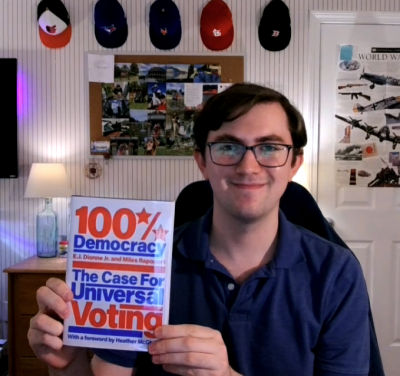
Students in IMRP Director Andrew Clark’s PP 1001: Intro to Public Policy course stepped out of the classroom and into Connecticut’s Old State House on a series of visits exploring democracy and voting access.
“UConn Hartford is uniquely positioned to give students access to both local and state government here in the capital city,” said Clark of the Old State House, which now functions as a museum hosting tours and events. Clark had previously brought spring-semester students to the state Capitol.
“UConn Hartford is uniquely positioned to give students access to both local and state government here in the capital city.”
The first visit acclimated students to the historic building just blocks from the School of Public Policy’s campus in downtown Hartford. The second event – on National Voter Registration Day – was organized in partnership with UConn and the Connecticut Democracy Center. Open to the public, it featured a roundtable discussion, “Voting, Voice, and Visibility – Past and Present,” with former Secretary of the State Miles Rapoport, executive director of 100% Democracy; former State Rep. Evelyn Mantilla; and Mary Janicki, former Director of the Office of Legislative Research.
Using a comparative lens that included other Western democracies—such as Australia, which has mandated compulsory voting for the past 100 years—students were asked: How can we raise voter turnout in our state and country to 90% or higher?
Class T.A. Ben Elliot, a first-year MPA candidate, said students were engaged, curious, and willing to challenge the panelists.

“Students had the opportunity to ask questions or offer critique of the former Secretary’s opinions,” Ben explained. “One student asked how we might raise voter turnout without making it compulsory. The concern is that if people are mandated to vote but haven’t done any research, they may not vote in their best interest—or the best interest of their fellow citizens.”
“We had a good dialogue on how to increase voter turnout.”
Students were “Excited to do something different other than listening to a lecture,” Ben laughed, also noting that the first visit included a tour of the property as a primer for the discussion with background on civil rights and the Voting Rights Act of 1965 and how marginalized groups who have faced resistance have both gained and maintained the right to vote.
Additional discussion included recent amendments to the Connecticut state constitution for in-person early voting and “no excuse” absentee ballots.
“That side of the conversation really resonated with me,” said Ben, who had interned as an undergrad with the Secretary of State’s office when early voting was introduced and helped gather data on the program’s success.

“We had a good dialogue on how to increase voter turnout,” he continued. “It presents an interesting debate because, on one end, it seems a little authoritarian, but at the same time, more participation in democracy could address issues we face—especially complaints that candidates don’t represent voters who didn’t participate in the process.”
Students also received a signed copy of Rapoport’s book, 100% Democracy, if they promised to read it—a promise Ben gratefully accepted.
A class discussion board assignment will extend the conversation as students reflect on their role as engaged citizens and how to encourage others to participate in elections.
————
For more information about the School of Public Policy’s Registrar of Voters Training Program, visit: https://publicpolicy.uconn.edu/rov/